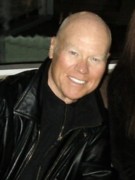A Quote by Gorgias
The effect of speech upon the condition of the soul is comparable to the power of drugs over the nature of bodies. For just as different drugs dispel different secretions from the body, and some bring an end to disease and others to life, so also in the case of speeches, some distress, others delight, some cause fear, others make the hearers bold, and some drug and bewitch the soul with a kind of evil persuasion.
Related Quotes
Every person has the power to make others happy. Some do it simply by entering a room others by leaving the room. Some individuals leave trails of gloom; others, trails of joy. Some leave trails of hate and bitterness; others, trails of love and harmony. Some leave trails of cynicism and pessimism; others trails of faith and optimism. Some leave trails of criticism and resignation; others trails of gratitude and hope. What kind of trails do you leave?
Memories are like a still life painted by ten different student artists: some will be blue-based; others red; some will be as stark as Picasso and others as rich as Rembrandt; some will be foreshortened and others distant. Recollections are in the eye of the beholder; no two held up side by side will ever quite match.
There are innumerable worlds of different sizes. In some there is neither sun not moon, in others they are larger than in ours and others have more than one. These worlds are at irregular distances, more in one direction and less in another, and some are flourishing, others declining. Here they come into being, there they die, and they are distroyed by collision with one another. Some of the worlds have no animal or vegetable life nor any water.
People who live in states have as a rule never experienced the state of nature and vice-versa, and have no practical possibility of moving from the one to the other ... On what grounds, then, do people form hypotheses about the relative merits of state and state of nature? ... My contention here is that preferences for political arrangements of society are to a large extent produced by these very arrangements, so that political institutions are either addictive like some drugs, or allergy-inducing like some others, or both, for they may be one thing for some people and the other for others.
Don't bother Me with promises. Vows are cheaply manufactured, come with no guarantees. Don't bother to say you love me. The word is indefinable. Joy to some, heartbreak to others, depending on circumstance. There is evidence that the emotion can make a person live longer, evidence it can kill you early. I think it's akin to a deadly disease. Or at least some exotic fever. Catch it, and you'd better, quick, swallow some medication to use as a weapon against the fire ravaging body and soul.
Different people call on [God] by different names: some as Allah, some as God, and others as Krishna, Siva, and Brahman. It is like the water in a lake. Some drink it at one place and call it 'jal', others at another place and call it 'pani', and still others at a third place and call it 'water'. The Hindus call it 'jal', the Christians 'water', and the Moslems 'pani'. But it is one and the same thing.
THE POWER OF A COMPELLING CAUSE RESTS IN THE SOUL OF ITS CREATOR, because a cause springs from the soul. It is a spiritual statement from one soul that cannot be the result of many. It comes from a deep place of knowing, some conviction that a richly imagined future could in some way, dramatically and positively, change the world.
Countless people have attempted to define the absolute power of the world of nature. Some praise it as god, some call it the Buddha, others call it truth. Still others convert nature into a philosophy by which they attempt to sound its deepest truth. Such attempts to define the power of nature are no more than striving to escape its effects.








































